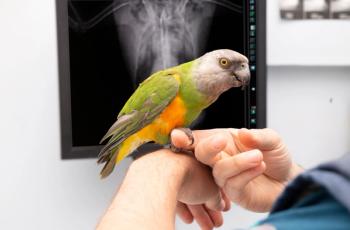
Are you allergic to your veterinary job?
It seems unfair, but the patients that you care for may be making you sick. Find out what you can do if you are suffering from allergies to animal dander.
(Shutterstock)We joke about being allergic to work, but for many people working in the veterinary industry (including me!), it's actually the truth. In fact, at least a third of veterinary professionals suffer from allergies to animal dander.1,2 Inhalant allergies to animal dander are occupational hazards, so chances are someone in your hospital-if not you-is suffering. And if quitting your job is not feasible (and let's face it, if the specter of staggering student loans didn't sway us, neither will itchy eyes or a runny nose), then you are going to have to learn to live with allergies.
Allergies in people are similar to what you see in your patients. In this case, you are the patient, and the allergens may be proteins in your veterinary patients' skin, urine and saliva. Your immune system is trying to protect you from a perceived threat, but in truth, the proteins are harmless and it is only your immune system that has gone awry.
People can be allergic to many things. But Michael C. Hollie, MD, a board-certified allergist, says he treats many veterinarians for animal allergies, probably because our exposure to animal dander is so intense. Signs of an allergy can include:
Itchy, watery eyes and nose
Sore throat or cold-like symptoms
Malaise
Breathing difficulty.
If you think allergies could be a problem, talk with your doctor. Testing by a board-certified allergist can help determine the allergen. Your allergist can design a hyposensitization program specific to your needs or prescribe antihistamines and other medications to minimize your allergic response.
Once you identify your allergies, here are some things that have helped me to minimize my reaction at work and home.
Be a good patient. Follow your doctor's advice regarding medication and strategies to maintain your health when facing allergies.
Get a break from dander. Most veterinary professionals also have their own pets, so your dander exposure can be around the clock. Create a place in your home that is pet-free so your immune system gets a rest (bedrooms are great because then you can be dander free all night). And having entire days in which you are not exposed to animal dander can help your immune system reset.
Put down the clippers. Avoid personally clipping or brushing patients' coats because it aerosolizes the protein near you. Assign these tasks to a team member who doesn't have allergies.
Wash that dog right out of your hair. At the end of your work day, change your clothes and wash your hands, face and hair. Dander sticking to your hair can be transferred to your pillow, irritating your nose and eyes all night.
Don't forget to flush. Nasal irrigation, like neti pots and sinus rinse kits, can help clear out the allergens at the end of the day.
Get to know your triggers. Even though there is NO truly hypoallergenic pet, certain breeds or patients may cause a stronger allergic reaction. As you get to know your body, you may start to recognize red flags. Check out the appointment schedule ahead of time and ask for help with these patients.
Most of all, don't feel alone. Look around. There are probably other allergy sufferers standing nearby right now. You can survive and thrive, even if you are allergic to your job!
References
1. Moghtaderi M, Farjadian S, Abbaszadeh Hasiri M. Animal allergen sensitization in veterinarians and laboratory animal workers. Occup Med (Lond) 2014;64(7):516-520.
2. Epp T, Waldner C. Occupational health hazards in veterinary medicine: zoonoses and other biological hazards. Can Vet J 2012;53(2):144-150.
Newsletter
From exam room tips to practice management insights, get trusted veterinary news delivered straight to your inbox—subscribe to dvm360.




